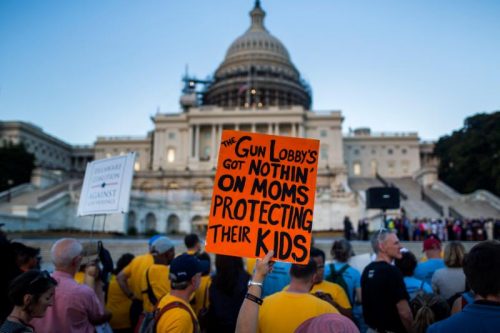Five years ago, just after the Sandy Hook massacre, I wrote a highly criticized column on gun control.
The causes of gun violence, I noted in that column, run deeper than easy access to guns, and include a media culture filled with violence, and consumer choices supporting it.
But I denied that we are powerless as a matter of public policy to decrease gun violence. I also reiterated long-held positions of the U.S. Conference of Catholic Bishops, namely, support for improved background check systems and bans on certain semi-automatic weapons and high-capacity ammunition magazines.

Multiple mass killings have transpired since Sandy Hook, most recently in Parkland, Florida, and the wisdom of the bishops’ consistent stance remains clear.
It is past time to put aside gun ideology and come together to protect the right to life.
Limits of gun regulation
Most gun regulations proposed in the wake of these tragedies will not significantly decrease gun deaths overall — most of which are suicides, followed secondly by homicides in urban areas.
Similarly, mass shootings are not primarily about guns. These tragic events, shaped by our violent culture, are often born out of despair. Hurt people hurt people.
If we limit access to guns, in some instances those same persons will find other ways to kill. The needed policy changes and moral renewal are more comprehensive than simply changing gun laws.
Yet, gun policy matters. Common-sense regulations to prevent the most egregious acts of gun violence come with very little cost and may save hundreds of lives per year.
Beyond fear, ideology
To move forward, the ideologies of gun absolutism need to be abandoned.
Gun opponents need to recognize that outright gun abolition is unlikely any time soon. The use of effective force in self-defense is a natural right, and the U.S. Constitution protects the use of a gun to do so.
If the policy goal is protection of human life, then the policy strategy should aim to build common ground and enact, incrementally, sensible laws. A policy strategy motivated instead by an ideological hatred of guns rather than the defense of persons is a political dead end.

Similarly, gun-rights advocates must recognize that they can either be part of the solution or remain part of the problem.
Much like abortion proponents, the rhetoric of gun-rights advocates often implies that any sensible and humane regulation is an illicit imposition on one’s choice — in this case, choice of weapon.
Hunters and farmers may prefer the use of AR-15s with bump stocks for recreation or defending livestock. But one must weigh a desire for a faster tool to shoot prairie dogs against the protection of the common good and others’ right to life.
Others claim military-style weapons are necessary to protect against a tyrannical government, the true meaning of the Second Amendment. The likelihood of a “well-regulated,” Minnesota citizen-militia being called up to fight the federal government is essentially zero, and the likelihood that an unsanctioned and unregulated militia effectively doing so is even smaller.
These arguments against background checks and banning bump stocks are a distraction from real, common-sense reform.
People of peace
Gun-rights absolutism often stems from fear and false worldly wisdom that counsels protection while nurturing a culture of death.
 According to the Center for Injury Research and Prevention, there are approximately 350 million guns in circulation in the United States; 113 guns for every 100 persons. Almost two million children live with unlocked, loaded guns in their home, and one out of three homes with kids has a gun. In 2014, 2,549 children (age 0 to 19 years) died by gunshots and an additional 13,576 were injured.
According to the Center for Injury Research and Prevention, there are approximately 350 million guns in circulation in the United States; 113 guns for every 100 persons. Almost two million children live with unlocked, loaded guns in their home, and one out of three homes with kids has a gun. In 2014, 2,549 children (age 0 to 19 years) died by gunshots and an additional 13,576 were injured.
At what cost does our obsession with guns achieve the “protection” we demand? There is a reason Our Lord said that those who live by the sword, die by the sword.
Though pacifism is a legitimate and noble strain of our Christian tradition, Catholic social teaching is not opposed to gun ownership for hunting or self-defense. In our society, it is a right and should be exercised responsibly.
But we must ask ourselves as Christians whether an absolutist position in support of gun rights — borne more in fear than faith — is what we want to convey to others. Are we promoting a culture of life and of peace? Are we working to turn swords into plowshares? Are we offering a credible witness to our faith as people of peace?
As disciples of the Prince of Peace we must renounce the trafficking, sale or stockpiling of weapons that have no serious civilian uses, and promote policies ensuring gun ownership promotes public safety and defends life, instead of hastening its destruction.
Jason Adkins is executive director of the Minnesota Catholic Conference.






















